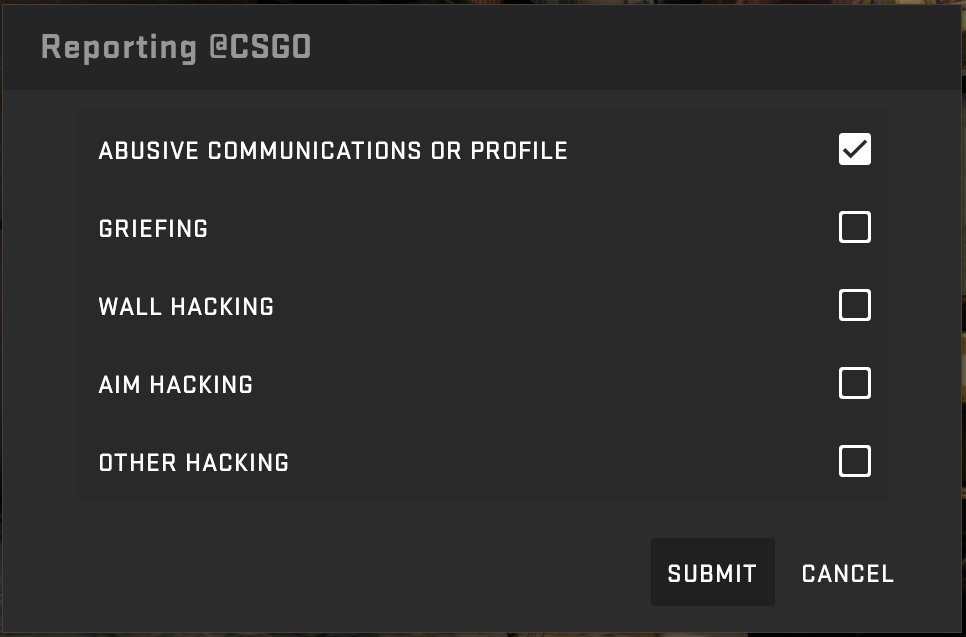The Hookup Critic
Your go-to source for honest reviews and tips on dating and relationships.
CSGO Toxicity Reports: When Your Teammate is the Real Enemy
Uncover the dark side of CSGO gameplay! Dive into stories of toxicity and betrayal when teammates become your worst enemies.
Understanding CSGO Toxicity: Identifying the Signs of a Toxic Teammate
In the competitive world of CSGO, player interactions can significantly impact both individual performance and overall team dynamics. Understanding CSGO toxicity involves recognizing various behaviors that can disrupt gameplay and diminish the gaming experience. Toxicity often manifests through verbal abuse, excessive complaining, or intentionally sabotaging teammates. For instance, if a player frequently blames others for losses without acknowledging their own mistakes, this is a clear sign of a toxic teammate. Additionally, aggressive communication styles, such as insults or derogatory remarks, can create a hostile environment that affects everyone in the match.
Identifying the signs of a toxic teammate in CSGO is essential for maintaining a positive gaming atmosphere. Look out for common indicators such as:
- Flaming or blaming teammates for mistakes.
- Refusal to cooperate and follow strategies.
- Persistent negativity and discouragement.
- Engaging in verbal harassment or bullying.
Recognizing these behaviors early can help players take the necessary steps to mitigate toxicity, either by muting offenders or reporting them, ensuring a more enjoyable gaming experience for all.

Counter-Strike is a popular first-person shooter game that emphasizes team-based gameplay and strategy. Players can choose between two teams, Terrorists and Counter-Terrorists, and engage in various game modes. One of the many cosmetic items that players can collect is the nomad knife, which showcases unique designs and adds a personal touch to the player’s character.
How to Handle Toxicity in CSGO: Strategies for Maintaining Team Morale
In the competitive world of CSGO, toxicity can quickly sour the atmosphere and hinder team performance. To effectively manage this negative behavior, it is vital to implement a few key strategies. First, establish clear communication guidelines among team members. Encourage players to voice their concerns respectfully, using a designated platform for feedback. Additionally, foster an environment where constructive criticism is welcomed, helping players feel valued rather than attacked. By promoting effective communication, teams can significantly reduce misunderstandings that often lead to toxic behavior.
Another essential strategy for maintaining team morale in CSGO is to incorporate regular team-building activities. These can range from casual in-game challenges to discussing personal interests outside the game, which helps players bond on a more personal level. It’s important to recognize and reward positive behavior as well. Consider implementing a peer recognition system, where players can acknowledge each other's contributions and sportsmanship. Implementing these strategies not only combats toxicity but also cultivates a more supportive and cohesive team culture, essential for achieving success in CSGO.
Why Do Teammates Turn Toxic? Exploring the Psychology Behind CSGO Toxicity
The world of competitive gaming, particularly in titles like CSGO, can be exhilarating yet fraught with tension. As players strive for victory, the pressure to perform can lead to a toxic atmosphere among teammates. This toxicity often stems from a combination of factors including stress, competitive nature, and the anonymity that online gaming provides. When individuals feel threatened or frustrated, especially after a series of poor performances, they may resort to negative behaviors such as blaming teammates, toxic communication, and even personal insults. Understanding these psychological triggers can shed light on why a seemingly cohesive group can devolve into a battleground of accusations and blame.
Moreover, the social dynamics within a team play a significant role in fostering toxicity. In CSGO, a lack of effective communication can lead to misunderstandings and conflict. When players feel their strategies or gameplay are being criticized or undermined, they may react defensively, amplifying the tension. Additionally, the culture of gaming itself often rewards aggressive behaviors, where slander and hostility are mistaken for passion or dedication. To combat this toxicity, teams need to promote a positive environment where communication is encouraged, and constructive feedback is the norm, ultimately leading to improved performance both individually and collectively.